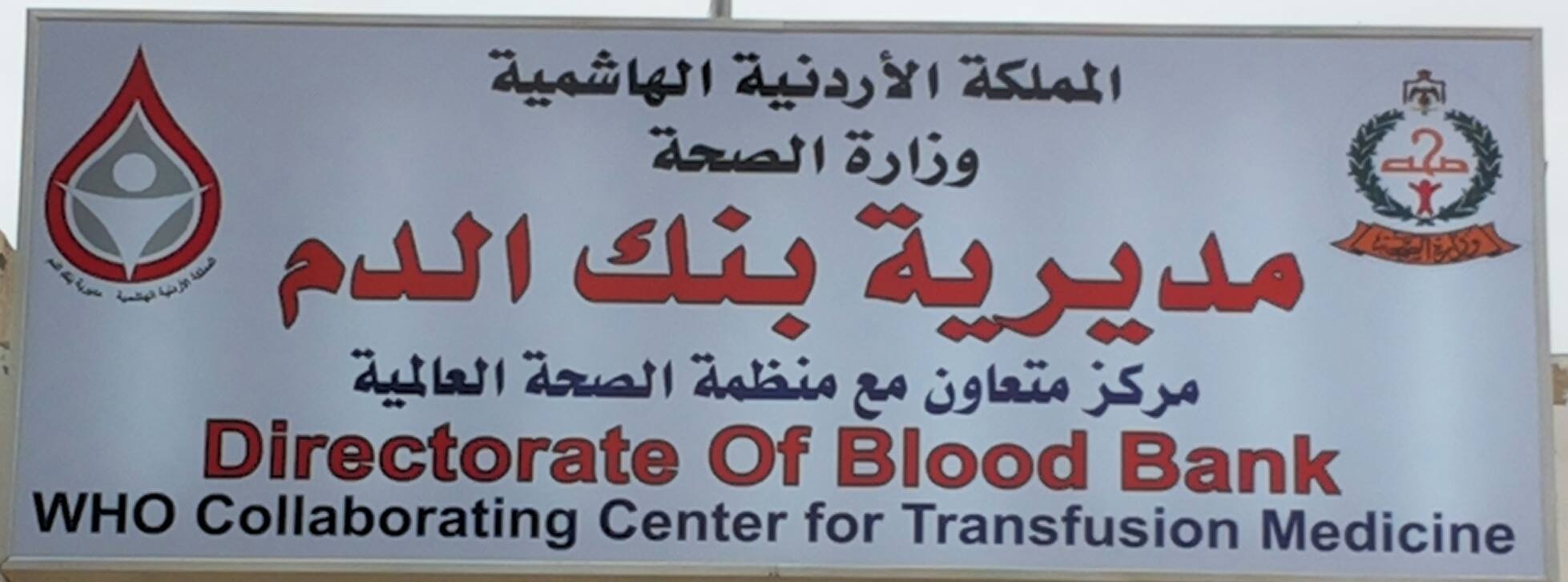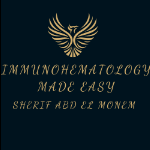
Reputation Activity
-
 emadlabs reacted to Malcolm Needs in Blood Group DiscrepancyLooks like an AsubgroupB to me, but, these days, with monoclonal antibodies, which type of A subgroup can only be accurately sorted by molecular techniques.
emadlabs reacted to Malcolm Needs in Blood Group DiscrepancyLooks like an AsubgroupB to me, but, these days, with monoclonal antibodies, which type of A subgroup can only be accurately sorted by molecular techniques.
The reverse group needs more investigation. It could be anti-A1, it could be another "cold" antibody specificity (such as anti-M or anti-P1), or it could be a combination of the two. If there is no reaction at 30oC and above, it doesn't really matter, but, to be on the safe side, if blood is required, I would give group B packed red cells, or group B red cells resuspended in AB plasma.
-
 emadlabs got a reaction from ANORRIS in incompatable ABO transfusion to sickle cell anemia patientincompatable ABO transfusion to sickle cell anemia patient complain of painful crisis
emadlabs got a reaction from ANORRIS in incompatable ABO transfusion to sickle cell anemia patientincompatable ABO transfusion to sickle cell anemia patient complain of painful crisis
women group O positive Rh has given 2 units AB negative packed R.B.Cs
the doctors dont sent any reaction and say that the patient take 2 units without any reactions !
now she in I.C.U section and her kiddney function test is normal or not worst
her l.f.t is good
Is her immune weak and this reason to not obtain any reaction according doctors !
in this case do this wrong transfusion the reason 100% about her case I mean the respnsibility
-
 emadlabs got a reaction from Sherif Abd El Monem in blood sampling after donationWe in Amman Jordan use Quadruple bags with a small bag that we can take samples of them without the mixing CPD blood
emadlabs got a reaction from Sherif Abd El Monem in blood sampling after donationWe in Amman Jordan use Quadruple bags with a small bag that we can take samples of them without the mixing CPD blood
-
 perhaps her titers of anti A and anti B were low?
perhaps her titers of anti A and anti B were low?
-
 emadlabs reacted to galvania in What is possible thing will occurs when we give B+ PRBCs for A+ female patient ?What needs to happen now is a thorough investigation of WHY this issue happened - not to apportion blame, but to ensure that it can never happen again due to an error in the lab
emadlabs reacted to galvania in What is possible thing will occurs when we give B+ PRBCs for A+ female patient ?What needs to happen now is a thorough investigation of WHY this issue happened - not to apportion blame, but to ensure that it can never happen again due to an error in the lab
-
 emadlabs reacted to Malcolm Needs in What is possible thing will occurs when we give B+ PRBCs for A+ female patient ?Thanks for the sad update emadlabs.
emadlabs reacted to Malcolm Needs in What is possible thing will occurs when we give B+ PRBCs for A+ female patient ?Thanks for the sad update emadlabs.
-
 emadlabs reacted to Malcolm Needs in What is possible thing will occurs when we give B+ PRBCs for A+ female patient ?I would advise A+, BUT, I am not a doctor.
emadlabs reacted to Malcolm Needs in What is possible thing will occurs when we give B+ PRBCs for A+ female patient ?I would advise A+, BUT, I am not a doctor.
-
 emadlabs got a reaction from Malcolm Needs in What is possible thing will occurs when we give B+ PRBCs for A+ female patient ?unfortunately the patient die after 19 days in icu
emadlabs got a reaction from Malcolm Needs in What is possible thing will occurs when we give B+ PRBCs for A+ female patient ?unfortunately the patient die after 19 days in icu
-
 emadlabs reacted to Malcolm Needs in INRAHi gagpinks,
emadlabs reacted to Malcolm Needs in INRAHi gagpinks,
INRA is the seventh antigen to be described in the Indian Blood Group System. It is unlikely to be presented at BBTS per se, but there may be a poster (I don't know).
Whether it is able to cause a HTR or HDFN, as yet, and until there is a formal publication, it is unknown, but antibodies within the Indian Blood Group System tend not to cause HDFN, as the antibodies tend to be adsorbed onto the apical surface of the placenta, rather than pass through the placenta, but they do seem to be capable of causing an HTR.
PLEASE BE AWARE THAT THERE ARE SEVERAL REPORTS ON THIS ON WEBSITES. Each of these appear to vie with the others to report the biggest load of rubbish and should be almost completely ignored.
I strongly suspect that Nicole Thornton will be at BBTS, and she would be able to tell you far more than can I. If you are going yourself, and you don't know Nicole, just ask anyone to point her out to you (she is the most approachable person you could wish to meet, and a very good friend of mine - so use my name if you wish - and then duck!!!!!!!!!!!).
-
 emadlabs reacted to Mosaics in Websites with case studiesDoes anybody know of websites (other than Immucor or American Red Cross's SUCCESS) that have interactive case studies for working up antibodies? The inner nerd in me is itching to antibody puzzles frequently.
emadlabs reacted to Mosaics in Websites with case studiesDoes anybody know of websites (other than Immucor or American Red Cross's SUCCESS) that have interactive case studies for working up antibodies? The inner nerd in me is itching to antibody puzzles frequently.
-
 emadlabs reacted to Malcolm Needs in ? Baby need c neg bloodLike Mabel, I would find it difficult to see why a normal healthy baby would suddenly require a transfusion a week after being born.
emadlabs reacted to Malcolm Needs in ? Baby need c neg bloodLike Mabel, I would find it difficult to see why a normal healthy baby would suddenly require a transfusion a week after being born.
Of course, shiley is also correct in saying that the FIRST thing you should do is Rh type the baby, as a minimum for the C and c antigens, but, if the baby is NOT c positive, I can see no reason whatsoever why you would want to give c negative blood, when the baby's DAT was negative, and the mother's anti-c did not appear until after delivery, and the baby's own immune system is incapable of producing such an antibody itself at this stage of life.
I think you are worrying unduly.
-
 emadlabs got a reaction from galvania in which is most siutable first case or seconed case ?when we take any order for transfusion blood first we do blood group and Rh factor
emadlabs got a reaction from galvania in which is most siutable first case or seconed case ?when we take any order for transfusion blood first we do blood group and Rh factor
for some patients ( Kidney failure و Thalassemia و sickle cells anemia ... etc ) we do phenotype for patient and give filtered RBCs
We do cross matching for units
Each unit of blood must be free of infectious diseases by blood, such as AIDS و hepatitis B و C و syphilis and anti-core
-
 emadlabs got a reaction from Malcolm Needs in which is most siutable first case or seconed case ?In Jordan The law prohibits the withdrawal of blood from non-citizens who do not have a national number , And often the patient's relatives and friends are donating his blood when acting surgery , We in Jordan give foreign patients blood without blood donation
emadlabs got a reaction from Malcolm Needs in which is most siutable first case or seconed case ?In Jordan The law prohibits the withdrawal of blood from non-citizens who do not have a national number , And often the patient's relatives and friends are donating his blood when acting surgery , We in Jordan give foreign patients blood without blood donation
and we Spend 5,000 units of blood a month and be very few cases of incompatible blood from 0 - 3 % or 6 cases in The worst conditions
we do cross matching for every unit prepared
-
 I don't think that there is any single correct answer to your question emadlabs.
I don't think that there is any single correct answer to your question emadlabs.
Whether or not you can perform a type and screen, and then giving blood without a crossmatch depends upon many factors for it to be a safe method.
Firstly, it depends upon the ethnic mix of both your patients and your donors. IF these are very similar, then it may well be safe.
However, this safety of doing this also depends upon whether your screening cells express all of the antigens commonly found amongst these ethnicities. For example, the Dia antigen is comparatively common in The Peoples' Republic of China and, because anti-Dia is a clinically significant antibody, their screening cells should express this antigen, but in the UK, the antigen is virtually never expressed, and so our screening cells, which do not express the Dia antigen, and so our screening cells would be "dangerous" if used in China.
Although when this technique was first mooted was before automation was common, it is now considered to be "dangerous", unless the ABO and D typing, as a minimum, are performed by automation, and the results transferred to a computer system with no human interference, and certainly no human alteration to the results.
Not being familiar with the situation in Jordan, therefore, I cannot answer the question with any authority.
-
 The only problem I can see (well, two problems potentially), is that one is supposed to check for hemolysis as a sign of a positive reaction when doing basic tests like ABO and screens. Also, as comparing the character of pre- and post- transfusion specimens is part of a possible transfusion reaction workup, there is a potential problem there, too.
The only problem I can see (well, two problems potentially), is that one is supposed to check for hemolysis as a sign of a positive reaction when doing basic tests like ABO and screens. Also, as comparing the character of pre- and post- transfusion specimens is part of a possible transfusion reaction workup, there is a potential problem there, too.
Scott
-
 I would agree with your first point Scott, but only because the sample being used is a plain tube, and, therefore, the liquid phase would be serum, rather than plasma. If, on the other hand, the sample was in an EDTA anticoagulated tube, and the liquid phase would, therefore, be plasma, you no longer see in vitro haemolysis, as EDTA will chelate the Ca++, Mn++ and Mg++, all of which are required as cofactors at the beginning of the classic complement pathway.
I would agree with your first point Scott, but only because the sample being used is a plain tube, and, therefore, the liquid phase would be serum, rather than plasma. If, on the other hand, the sample was in an EDTA anticoagulated tube, and the liquid phase would, therefore, be plasma, you no longer see in vitro haemolysis, as EDTA will chelate the Ca++, Mn++ and Mg++, all of which are required as cofactors at the beginning of the classic complement pathway.
I certainly agree with your second point, unless, as Anna says, there is in vivo haemolysis in the original sample (which is very often seen in cases of CHAD, even if the sample is kept at 37oC).
-
 I think you have to be a bit pragmatic. If the sample comes from a generally healthy adult and the sample is haemolysed simply because of poor phlebotomy technique, then I would say, ask for another sample. But you don't really want to insist if the sample comes from a young child or a very elderly person with poor veins - or, of course, if the haemolysis reflects the true state of the patient's blood at the time
I think you have to be a bit pragmatic. If the sample comes from a generally healthy adult and the sample is haemolysed simply because of poor phlebotomy technique, then I would say, ask for another sample. But you don't really want to insist if the sample comes from a young child or a very elderly person with poor veins - or, of course, if the haemolysis reflects the true state of the patient's blood at the time
-
 We ask for another sample.
We ask for another sample.
-
 Do you use EDTA blood samples?
Do you use EDTA blood samples?
We use EDTA blood samples and Anti-IgG gel cards. We don't reject hemolyzed blood samples unless black text on white paper cannot be read through the hemolyzed plasma.




